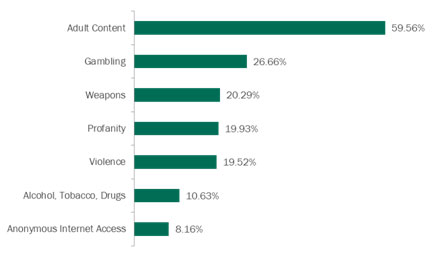
Top stories






More news
















The main findings of the report are:
The internet has long ceased to be the preserve of grown-ups. Children today are often far more active internet users than their parents. But is it safe enough for children to use without fear of facing inappropriate content? To find out, Kaspersky Lab decided to investigate potential online threats to children, by analysing data from users of Kaspersky Lab products equipped with a Parental Control module.
Percentage of unique users who encountered sites included in the dangerous categories in 2014

Websites carrying these kinds of inappropriate content (adult, chat, gambling and weapons), along with others featuring drugs, tobacco and alcohol, were the ones blocked most often by Kaspersky Lab protection solutions. The frequency of detections demonstrates just how easy it is for users to encounter such content online. The higher the frequency: the greater the probability.
In geographical terms, the countries with the most frequent Parental Control detections were China, the US, Germany, the UK, and Russia. France, Vietnam, Brazil and Algeria also ranked in the top 10 in terms of inappropriate content detection - but were relatively safer due to a lower frequency of detection.
Each country or region has its own distinct characteristics when it comes to the prevailing online threats for children. For instance, adult content was the biggest threat to users in most Eastern European countries: Czech Republic (66 detections per user), Romania (127 detections per user), Greece (185 detections per user), Hungary (263 detections per user). Content about alcohol, tobacco and drugs was a major threat to users from Russia, Ukraine, Germany, the US and France. The frequency of detection was especially high in these countries. Gambling is a prevailing online threat for children from Baltic states (118 detections per user).
"To protect young people, we recommend that adults choose protection solutions with Parental Control technologies and make full use of safe 'children' modes in search engines and applications that allow access to multimedia content and which are used by children.
However, although Parental Control technologies can block access to web sites with content that is dangerous or distressing for children, they cannot offer reliable protection in situations where safe-by-default web services like social networks or chats are misused by predators or users conducting cyberbullying campaigns. Internet security deserves to be taken as seriously as real-life physical security. That's why we urge parents to take an active part in their children's real and digital lives. Only then can they be sure that they won't miss the moment when their child might need their support," said Konstantin Ignatev, Web Content Analysts Group Manager of Kaspersky Lab.
Read more about online threats to children.
The Parental Control module for Mac OS X and Windows is included in Kaspersky Lab's consumer security products Kaspersky Internet Security - multi-device 2015 and Kaspersky Total Security - multi-device. The company also recently introduced a new standalone solution: Kaspersky Safe Kids Beta, which protects kids from inappropriate web content, potentially dangerous apps and other threats on Mac OS X, Windows, Android and iOS devices.